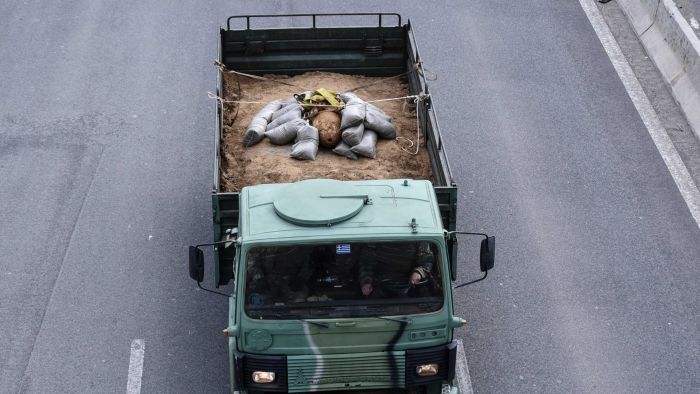WWII bomb deactivated in Greece after forcing massive evacuation of Thessaloniki
Updated
A World War II bomb has forced a massive evacuation in Greece's second-largest city, but also gave a group of stranded refugees a rare day-trip to the museum.
Key points:
- The evacuation is one of biggest in peacetime
- Up to 72,000 people asked to leave their homes for a short time
- A group of refugees visit museum, tourist site while bomb being defused
The bomb was deactivated by specialists by midday on Sunday local time, and was taken from the site just to the west of central Thessaloniki to a military shooting range to be destroyed.
Up to 72,000 residents living within a two-kilometre radius of the bomb site had been asked to leave their homes for local gyms, stadiums and cafes.
Many people left the area in their cars, but some were bused to schools and sports halls elsewhere in the city.
The 250-kilogram bomb was discovered about five metres below ground during excavation works at a petrol station last week.
"Phase two of the bomb removal operation was successfully completed. Citizens can safely return to their homes," Regional Governor Apostolos Tzitzikostas wrote on Twitter.
Calling the operation "a total success", he said it was the largest peacetime population evacuation in Greece.
"We heard on TV that, if the bomb explodes, it will be like a strong earthquake," resident Michalis Papanos said as he and his wife, Yiannoula, headed out of their home
 Photo:
Residents of Thessaloniki's Kordelio district were ordered to leave so experts could defuse the bomb. (AP: Giannis Papanikos)
Photo:
Residents of Thessaloniki's Kordelio district were ordered to leave so experts could defuse the bomb. (AP: Giannis Papanikos)
For one group of refugees and migrants the discovery of the bomb led to an excursion to a museum.
The group, many of them Syrians fleeing the civil war there, live in a nearby former toilet paper factory.
They were taken to the Archaeological Museum of Thessaloniki, a listed monument whose permanent exhibitions include masterpieces of ancient Greek art dating from prehistoric times to late antiquity.
About 450 people live in the Softex refugee camp in an industrial zone on the outskirts of the city, in conditions described as "prison-like" by Amnesty International.
They are among about 60,000 refugees and migrants stranded in makeshift and formal camps across Greece since Balkan countries closed their borders last March to those seeking passage to western and northern Europe.
Greece's migration ministry said Sunday's trip was organised at the request of the refugees, and Greek state TV said they would also visit Thessaloniki's White Tower, a waterfront monument and one of Greece's most recognisable buildings.
Reuters
 Photo:
People sheltering in a municipal hall, part of an evacuation plan during an operation to defuse a WWII bomb. (Reuters: Alexandros Avramidis)
Photo:
People sheltering in a municipal hall, part of an evacuation plan during an operation to defuse a WWII bomb. (Reuters: Alexandros Avramidis)
Topics: history, world-war-2, community-and-society, accidents---other, greece
First posted








